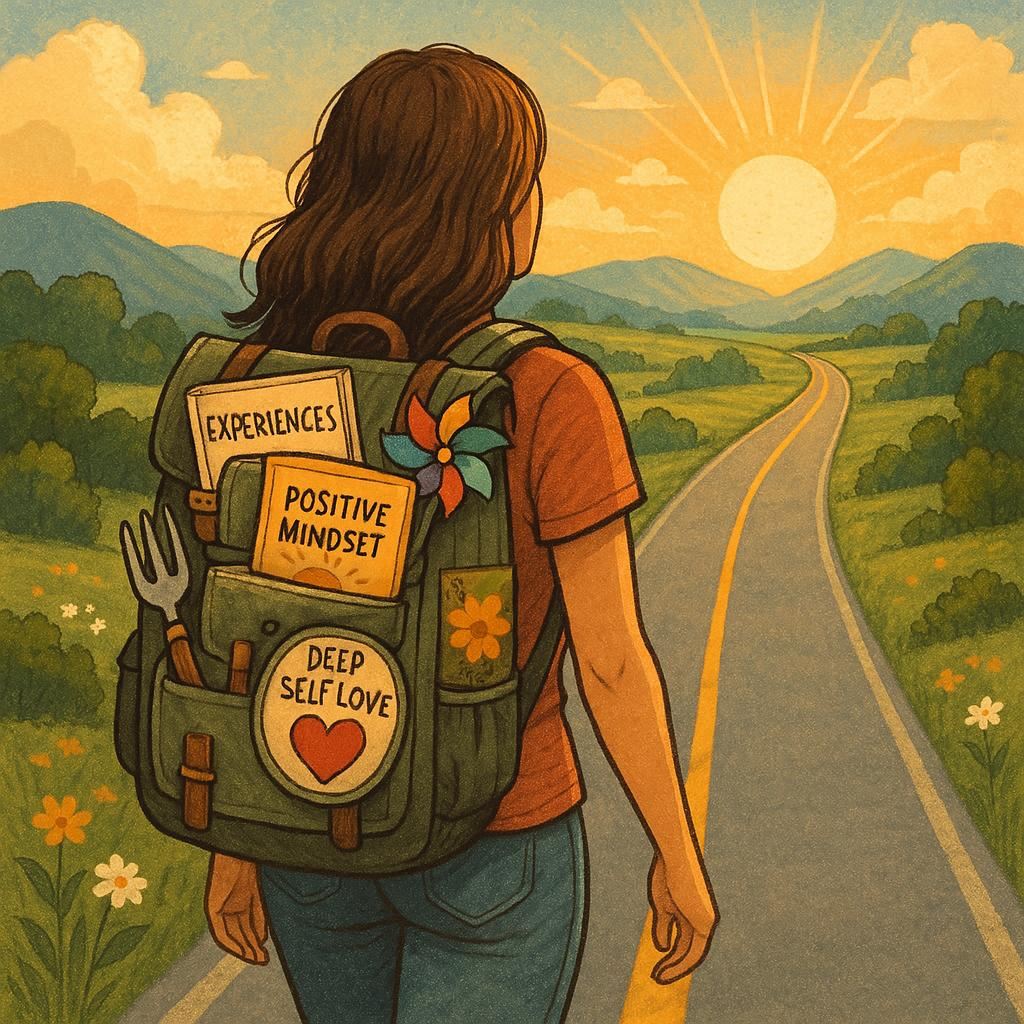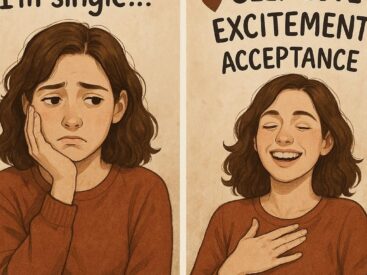The quiet ache of feeling “behind”
There comes a point for many of us, often in our late 20s or 30s, when we look at where we are in life and feel an unsettling heaviness: “I thought I’d be further along by now.”
Maybe you assumed you’d be married, have children, own a home, or have your dream career. Instead, you’re looking around and realizing that things don’t look the way you thought they would. Maybe you’re single while your friends are married. Maybe you’re working a job that pays the bills but doesn’t light you up. Maybe you’ve just come out of a breakup or divorce, and it feels like you’re starting over from scratch while everyone else is moving ahead.
This feeling of being “lost” isn’t just about circumstances. It’s about the painful gap between expectation and reality — and the way societal timelines whisper (or shout) that we’re falling behind.
But here’s the truth: feeling lost is part of being human. It doesn’t mean you’re broken, failing, or destined to miss out. It means you’re at a crossroads — and that’s not the end of your story, it’s the beginning of a new chapter.
Why we feel lost: The blueprint that wasn’t ours
Most of us carry an invisible blueprint for how life “should” go:
- Graduate by 22.
- Married by 28.
- Children by 30.
- Career success by 35.
When reality doesn’t match this timeline, we panic. But where did that timeline even come from? Who decided that happiness had an expiration date?
The truth is, much of this blueprint isn’t ours. It’s inherited — from parents, culture, media, and social comparison. It’s based on external validation, not inner alignment.
And so, when life veers off script, we feel defective. We assume something must be wrong with us. But often, what’s really happening is that life is dismantling a blueprint that never truly belonged to us.
The underlying emotion: Grief
When we feel lost, there’s often an unspoken emotion beneath it: grief.
Grief for the version of life we thought we’d have.
Grief for the imagined partner, the career milestones, the picture-perfect family.
Grief for the self we thought we’d be by now.
This grief is valid. You’re allowed to mourn the vision of life that didn’t unfold. But grief can also become a gateway — because once we acknowledge what hurts, we can begin to release it and create space for something truer, something uniquely ours.
Shifting the perspective: You’re not lost, you’re becoming
What if instead of being “lost”, you’re in a process of becoming?
Think about it: growth rarely feels orderly or linear. Seeds break apart before they sprout. Butterflies dissolve into goo before they fly. Forests burn before new life appears.
What you’re experiencing might not be failure — it might be the necessary unraveling before your becoming.
Practical ways to stop feeling lost
Let’s move from theory to practice. Here are some exercises and reflective questions to help you shift from lost → grounded, from defeated → hopeful.
1. Identify where you’re not lost
When life feels off-track, we tend to paint with broad strokes: “Everything is wrong. I’m failing.” But rarely is that true.
Exercise:
- Ask yourself: “In which areas of my life am I not lost, or even further along than I had expected to be?”
- Write down every area — no matter how small. Maybe you’ve built deep friendships. Maybe you’ve grown stronger after heartbreak. Maybe you’re healthier, more self-aware, or more resilient than your younger self ever was.
Reflection question:
- How does acknowledging these areas change the way I see myself and my journey?
This helps you see that you’re not lost in all areas — you’re just recalibrating in some.
2. Reframe the language
Language shapes perception. Saying “I’m lost” reinforces the belief that you’re broken or stuck. But what if you swapped the words?
Exercise:
- Rewrite the statement “I’m lost” into “I am in the process of…”
- Example: Instead of “I’m lost in my career,” → “I am in the process of finding meaningful work.”
- Instead of “I’m lost in love,” → “I am in the process of learning what healthy love looks like.”
Reflection question:
- How does saying “I’m in the process of…” make me feel differently about my current stage of life?
This shift from finality to process opens up possibility, hope, and self-compassion.
3. Redefine success on your terms
Ask yourself: whose timeline am I measuring myself against?
Exercise:
- Write down: “If I removed society’s expectations, what would success look like for me right now?”
- Be honest. Maybe success means having time for creativity, building a business slowly, traveling, or deepening your inner work.
Reflection question:
- What actually brings me alive? Am I willing to value that more than external timelines?
4. Find the hidden lessons
Often, the seasons we label as “lost” are the ones that shape us most.
Exercise:
- Journal: “What has this ‘lost’ season taught me about myself? What strengths, wisdom, or resilience have I gained?”
Reflection question:
- How might this experience be preparing me for what’s next?
5. Practice self-forgiveness
Feeling lost often comes with shame: “I should have known better. I should be further along.” But shame keeps us stuck.
Exercise:
- Write a forgiveness letter to yourself:
- “I forgive myself for not being where I thought I’d be by now.”
- “I forgive myself for comparing my journey to others.”
- “I forgive myself for being human, learning, and growing at my own pace.”
Reflection question:
- What happens inside me when I let go of self-blame and hold compassion instead?
6. Anchor into gratitude for the present
Sometimes the best way to move forward is to come back to now.
Exercise:
- Each night, write down 3 things you’re grateful for today. Not big achievements — but small, grounding things: a good conversation, the way the sun hit the trees, your resilience.
Reflection question:
- How does gratitude shift the way I see my current season?
The truth about “timelines”
Here’s something worth remembering: life isn’t a race. It’s not linear.
Some people marry young and divorce later. Some build a career at 30 and pivot at 40. Some find love at 25, others at 55.
Your worth is not tied to hitting milestones by a certain age. Your timeline is sacred, unique, and unfolding in ways you can’t always see in the moment.
What feels like delay may actually be preparation.
Acceptance: Making peace with the journey
Acceptance doesn’t mean settling. It means making peace with where you are so you can move forward with clarity instead of resistance.
Ask yourself:
- What if nothing has gone wrong?
- What if I’m exactly where I need to be to grow into the person I’m becoming?
Acceptance allows you to shift from fighting your reality to working with it. And that shift alone can dissolve the feeling of being lost.
Closing thoughts: You’re not behind, you’re becoming
If you feel lost in your late 20s or 30s, remember: you are not behind. You’re in process. You’re becoming.
The blueprint you thought you were supposed to follow was never the full truth. Your life is unfolding differently because it’s unfolding authentically.
And one day, you may look back at this season with gratitude — because it was the moment you stopped living for society’s timeline and started living for your own.
Quick recap of practices
- Identify where you’re not lost → build confidence.
- Reframe your language → shift from “lost” to “in process.”
- Redefine success → create your own blueprint.
- Find the hidden lessons → honor growth.
- Practice self-forgiveness → release shame.
- Anchor into gratitude → ground in the present.
Final reflective question
✨ If I trusted that I am not behind, but exactly on time, how would I live differently right now?



